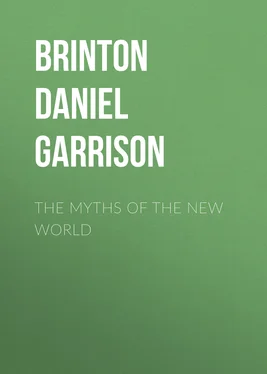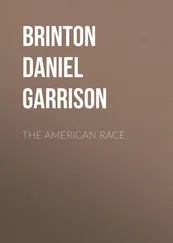Daniel Brinton - The Myths of the New World
Здесь есть возможность читать онлайн «Daniel Brinton - The Myths of the New World» — ознакомительный отрывок электронной книги совершенно бесплатно, а после прочтения отрывка купить полную версию. В некоторых случаях можно слушать аудио, скачать через торрент в формате fb2 и присутствует краткое содержание. Жанр: foreign_prose, История, Старинная литература, Мифы. Легенды. Эпос, foreign_edu, foreign_antique, на английском языке. Описание произведения, (предисловие) а так же отзывы посетителей доступны на портале библиотеки ЛибКат.
- Название:The Myths of the New World
- Автор:
- Жанр:
- Год:неизвестен
- ISBN:нет данных
- Рейтинг книги:5 / 5. Голосов: 1
-
Избранное:Добавить в избранное
- Отзывы:
-
Ваша оценка:
- 100
- 1
- 2
- 3
- 4
- 5
The Myths of the New World: краткое содержание, описание и аннотация
Предлагаем к чтению аннотацию, описание, краткое содержание или предисловие (зависит от того, что написал сам автор книги «The Myths of the New World»). Если вы не нашли необходимую информацию о книге — напишите в комментариях, мы постараемся отыскать её.
The Myths of the New World — читать онлайн ознакомительный отрывок
Ниже представлен текст книги, разбитый по страницам. Система сохранения места последней прочитанной страницы, позволяет с удобством читать онлайн бесплатно книгу «The Myths of the New World», без необходимости каждый раз заново искать на чём Вы остановились. Поставьте закладку, и сможете в любой момент перейти на страницу, на которой закончили чтение.
Интервал:
Закладка:
Best known to us of all the Indians are the Algonkins and Iroquois, who, at the time of the discovery, were the sole possessors of the region now embraced by Canada and the eastern United States north of the thirty-fifth parallel. The latter, under the names of the Five Nations, Hurons, Tuscaroras, Susquehannocks, Nottoways and others, occupied much of the soil from the St. Lawrence and Lake Ontario to the Roanoke, and perhaps the Cherokees, whose homes were in the secluded vales of East Tennessee, were one of their early offshoots. 17 17 The Cherokee tongue has a limited number of words in common with the Iroquois, and its structural similarity is close. The name is of unknown origin. It should doubtless be spelled Tsalakie , a plural form, almost the same as that of the river Tellico, properly Tsaliko (Ramsey, Annals of Tennessee , p. 87), on the banks of which their principal towns were situated. Adair’s derivation from cheera , fire, is worthless, as no such word exists in their language.
They were a race of warriors, courageous, cruel, unimaginative, but of rare political sagacity. They are more like ancient Romans than Indians, and are leading figures in the colonial wars.
The Algonkins surrounded them on every side, occupying the rest of the region mentioned and running westward to the base of the Rocky Mountains, where one of their famous bands, the Blackfeet, still hunts over the valley of the Saskatchewan. They were more genial than the Iroquois, of milder manners and more vivid fancy, and were regarded by these with a curious mixture of respect and contempt. Some writer has connected this difference with their preference for the open prairie country in contrast to the endless and sombre forests where were the homes of the Iroquois. Their history abounds in great men, whose ambitious plans were foiled by the levity of their allies and their want of persistence. They it was who under King Philip fought the Puritan fathers; who at the instigation of Pontiac doomed to death every white trespasser on their soil; who led by Tecumseh and Black Hawk gathered the clans of the forest and mountain for the last pitched battle of the races in the Mississippi valley. To them belonged the mild mannered Lenni Lenape, who little foreboded the hand of iron that grasped their own so softly under the elm tree of Shackamaxon, to them the restless Shawnee, the gypsy of the wilderness, the Chipeways of Lake Superior, and also to them the Indian girl Pocahontas, who in the legend averted from the head of the white man the blow which, rebounding, swept away her father and all his tribe. 18 18 The term Algonkin may be a corruption of agomeegwin , people of the other shore. Algic, often used synonymously, is an adjective manufactured by Mr. Schoolcraft “from the words Alleghany and Atlantic” (Algic Researches, ii. p. 12). There is no occasion to accept it, as there is no objection to employing Algonkin both as substantive and adjective. Iroquois is a French compound of the native words hiro , I have said, and kouè , an interjection of assent or applause, terms constantly heard in their councils.
Between their southernmost outposts and the Gulf of Mexico were a number of clans, mostly speaking the Muscogee tongue, Creeks, Choctaws, Chikasaws, and others, in later times summed up as Apalachian Indians, but by early writers sometimes referred to as “The Empire of the Natchez.” For tradition says that long ago this small tribe, whose home was in the Big Black country, was at the head of a loose confederation embracing most of the nations from the Atlantic coast quite into Texas; and adds that the expedition of De Soto severed its lax bonds and shook it irremediably into fragments. Whether this is worth our credence or not, the comparative civilization of the Natchez, and the analogy their language bears to that of the Mayas of Yucatan, the builders of those ruined cities which Stephens and Catherwood have made so familiar to the world, attach to them a peculiar interest. 19 19 Apalachian, which should be spelt with one p, is formed of two Creek words, apala , the great sea, the ocean, and the suffix chi , people, and means those dwelling by the ocean. That the Natchez were offshoots of the Mayas I was the first to surmise and to prove by a careful comparison of one hundred Natchez words with their equivalents in the Maya dialects. Of these, five have affinities more or less marked to words peculiar to the Huastecas of the river Panuco (a Maya colony), thirteen to words common to Huasteca and Maya, and thirty-nine to words of similar meaning in the latter language. This resemblance may be exemplified by the numerals, one, two, four, seven, eight, twenty. In Natchez they are hu , ah , gan , uk-woh , upku-tepish , oka-poo : in Maya, hu , ca , can , uk , uapxæ , hunkal . (See the Am. Hist. Mag., New Series, vol. i. p. 16, Jan. 1867.)
North of the Arkansas River on the right bank of the Mississippi, quite to its source, stretching over to Lake Michigan at Green Bay, and up the valley of the Missouri west to the mountains, resided the Dakotas, an erratic folk, averse to agriculture, but daring hunters and bold warriors, tall and strong of body. 20 20 Dakota, a native word, means friends or allies.
Their religious notions have been carefully studied, and as they are remarkably primitive and transparent, they will often be referred to. The Sioux and the Winnebagoes are well-known branches of this family.
We have seen that Dr. Richardson assigned to a portion of the Athapascas the lowest place among North American tribes, but there are some in New Mexico who might contest the sad distinction, the Root Diggers, Comanches and others, members of the Snake or Shoshonee family, scattered extensively northwest of Mexico. It has been said of a part of these that they are “nearer the brutes than probably any other portion of the human race on the face of the globe.” 21 21 Rep. of the Commissioner of Indian Affairs, 1854, p. 209.
Their habits in some respects are more brutish than those of any brute, for there is no limit to man’s moral descent or ascent, and the observer might well be excused for doubting whether such a stock ever had a history in the past, or the possibility of one in the future. Yet these debased creatures speak a related dialect, and are beyond a doubt largely of the same blood as the famous Aztec race, who founded the empire of Anahuac, and raised architectural monuments rivalling the most famous structures of the ancient world. This great family, whose language has been traced from Nicaragua to Vancouver’s Island, and whose bold intellects colored all the civilization of the northern continent, was composed in that division of it found in New Spain chiefly of two bands, the Toltecs, whose traditions point to the mountain ranges of Guatemala as their ancient seat, and the Nahuas, who claim to have come at a later period from the northwest coast, and together settled in and near the valley of Mexico. 22 22 According to Professor Buschmann Aztec is probably from iztac , white, and Nahuatlacatl signifies those who speak the language Nahuatl , clear sounding, sonorous. The Abbé Brasseur (de Bourbourg), on the other hand, derives the latter from the Quiche nawal , intelligent, and adds the amazing information that this is identical with the English know all !! ( Hist. du Mexique , etc., i. p. 102). For in his theory several languages of Central America are derived from the same old Indo-Germanic stock as the English, German, and cognate tongues. Toltec, from Toltecatl , means inhabitant of Tollan, which latter may be from tolin , rush, and signify the place of rushes. The signification artificer , often assigned to Toltecatl, is of later date, and was derived from the famed artistic skill of this early folk (Buschmann, Aztek. Ortsnamen , p. 682: Berlin, 1852). The Toltecs are usually spoken of as anterior to the Nahuas, but the Tlascaltecs and natives of Cholollan or Cholula were in fact Toltecs, unless we assign to this latter name a merely mythical signification. The early migrations of the two Aztec bands and their relationship, it may be said in passing, are as yet extremely obscure. The Shoshonees when first known dwelt as far north as the head waters of the Missouri, and in the country now occupied by the Black Feet. Their language, which includes that of the Comanche, Wihinasht, Utah, and kindred bands, was first shown to have many and marked affinities with that of the Aztecs by Professor Buschmann in his great work, Ueber die Spuren der Aztekischen Sprache im nördlichen Mexico und höheren Amerikanischen Norden , p. 648: Berlin, 1854.
Outlying colonies on the shore of Lake Nicaragua and in the mountains of Vera Paz rose to a civilization that rivalled that of the Montezumas, while others remained in utter barbarism in the far north.
Интервал:
Закладка:
Похожие книги на «The Myths of the New World»
Представляем Вашему вниманию похожие книги на «The Myths of the New World» списком для выбора. Мы отобрали схожую по названию и смыслу литературу в надежде предоставить читателям больше вариантов отыскать новые, интересные, ещё непрочитанные произведения.
Обсуждение, отзывы о книге «The Myths of the New World» и просто собственные мнения читателей. Оставьте ваши комментарии, напишите, что Вы думаете о произведении, его смысле или главных героях. Укажите что конкретно понравилось, а что нет, и почему Вы так считаете.












